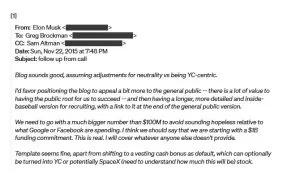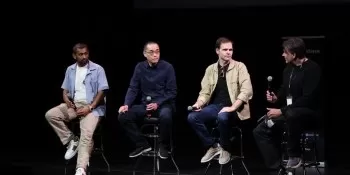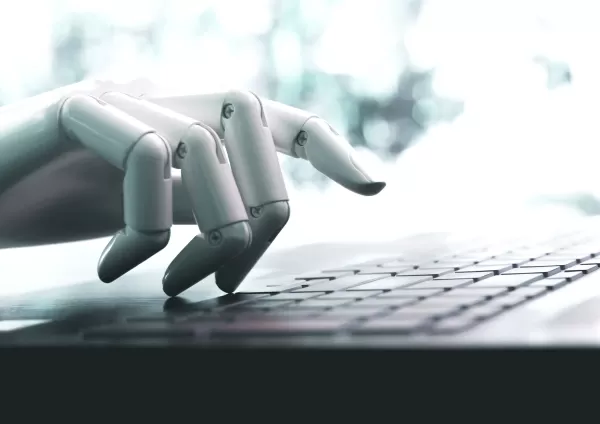Elon Musk's Lawsuit Against OpenAI: A Detailed Analysis
In the fast-paced world of artificial intelligence, a legal drama is unfolding that highlights the tension between visionary ideals and corporate realities. Elon Musk, a name synonymous with tech innovation, has taken legal action against OpenAI, the AI research organization he co-founded. At the heart of this lawsuit is Musk's belief that OpenAI has strayed from its original mission of developing AI for the greater good of humanity as a non-profit.
This legal battle raises critical questions about the ethical development of AI, challenging the narrative of technological progress and sparking a philosophical debate on AI's purpose. To truly grasp the situation, it's essential to delve into the current landscape.
Musk’s Criticism of OpenAI’s Founding Vision vs. Current Reality
When OpenAI first emerged on the scene, it was a breath of fresh air—a non-profit organization committed to advancing artificial intelligence for humanity's benefit. Founded in 2015 with significant input and funding from Elon Musk, OpenAI set out with a clear and noble mission: to counter the dominance of tech giants like Google in AI and ensure that AI advancements were accessible and beneficial to everyone.
Fast forward to 2024, and the story has taken a dramatic twist. Musk, who left the board in 2018, now sees OpenAI's path as a significant departure from its initial vision. His lawsuit alleges that OpenAI has abandoned its commitment to remain a non-profit, pointing specifically to the leadership of Sam Altman and Greg Brockman. He claims that since forming a major partnership with Microsoft, OpenAI has shifted its focus towards profit-making ventures.
Musk feels betrayed, arguing that the organization promised to keep its technology freely available to the public. Instead, he alleges, OpenAI has become a "closed-source de facto subsidiary" of Microsoft, prioritizing commercial interests over public welfare. This, according to Musk, contradicts OpenAI's founding principles and its commitment to developing AI for humanity's benefit.
The lawsuit zeroes in on OpenAI's partnership with Microsoft, which reportedly involved investments totaling around $13 billion. Musk contends that this partnership has led OpenAI to prioritize refining AI technologies like GPT-4 for commercial gain rather than altruistic purposes.
OpenAI's Counterarguments: Financial Contributions and Strategic Choices
OpenAI's response to Musk's lawsuit involves a critical look at his financial contributions. In a company blog, OpenAI asserts that Musk's actual monetary input was around $45 million, far less than the up to $1 billion he had initially pledged. This disclosure aims to recalibrate perceptions of Musk's influence on OpenAI's development and success. They further highlight that their funding, exceeding $90 million from various donors, was crucial in advancing their research, thereby diminishing the significance of Musk's financial role.

A key point in OpenAI's defense is Musk's vision for integrating OpenAI with Tesla, his electric vehicle company. This reveals a stark difference in strategic visions between Musk and OpenAI's leadership. According to OpenAI, during discussions about transitioning to a for-profit model, Musk proposed either a merger with Tesla or a model where Tesla would have significant control over OpenAI. Musk believed that Tesla's resources and technology could enhance OpenAI's capabilities, potentially creating a strong competitor against companies like Google.
However, OpenAI rejected this integration, fearing it could divert them from their mission of developing AI openly and accessibly. This decision led Musk to distance himself from OpenAI and eventually start his own AI initiatives.
In their defense, OpenAI portrays their shift to a for-profit entity as a strategic necessity rather than a departure from their initial ethos. They argue that the financial and computational demands of developing advanced AI technologies, like artificial general intelligence (AGI), necessitated this change. This shift, they believe, was essential to sustain and scale their ambitious AI projects.
OpenAI maintains that their commitment to benefiting humanity remains strong, though approached through a different structural model. They contend that the for-profit model does not inherently contradict their mission but rather enables them to achieve it on a larger scale. This perspective is crucial in understanding the complexities of the lawsuit and the delicate balance between idealistic goals and practical realities in AI development.
Heart of the Debate: Microsoft and AGI
At the core of Musk's lawsuit is the concern over the use of intellectual property, particularly related to GPT-4 and other advanced AI models. Musk alleges that these technologies, which he views as nearing AGI, were meant to be developed for humanity's benefit, not for the financial gain of a single corporation. He worries that OpenAI's close ties with Microsoft have led to AGI being used primarily to serve Microsoft's commercial interests rather than more altruistic, globally beneficial purposes.
In response, OpenAI counters Musk's allegations by reaffirming their commitment to humanity. They argue that their partnership with Microsoft and the shift to a for-profit model do not signify a deviation from their mission. Instead, they see it as a strategic move to amplify their impact and reach in the AI field.
OpenAI highlights that the resources and support from their Microsoft partnership have been vital in advancing AI research and development, making technologies like GPT-4 more robust and effective. They argue that this collaboration has allowed them to scale their operations and extend the reach of their AI technologies to a broader audience, fulfilling their goal of making AI benefits accessible to society at large.
Moreover, OpenAI addresses Musk's AGI concerns by emphasizing that their development of such technologies remains governed by ethical guidelines and a commitment to safety and public welfare. They stress that their strategic decisions are still aligned with the goal of creating AI that positively impacts humanity, even within a for-profit framework.
Shaping the Future of AI Development
The legal battle between Elon Musk and OpenAI goes beyond a simple corporate dispute; it has the potential to leave a lasting mark on the AI industry. This lawsuit, focusing on the use and control of groundbreaking technologies like GPT-4 and AGI, could set significant precedents for how AI companies operate and collaborate. The outcome may reshape industry dynamics, influencing how AI technologies are developed, commercialized, and made accessible to the public.
At the heart of this conflict is a deeper debate about the ethical deployment of AI. The lawsuit emphasizes the need for a balanced approach that integrates innovation, commercial viability, and ethical considerations. How AI entities like OpenAI navigate this balance could serve as a model for the broader industry, impacting policies and practices surrounding AI development.
As AI continues to evolve and permeate various aspects of society, the resolution of this lawsuit may offer crucial insights into how these powerful technologies should be governed and for whose benefit they should be optimized. In an era where AI's impact is increasingly pervasive, the Musk vs. OpenAI saga is not just a legal battle but a reflection of the ongoing struggle to align technological advancement with the greater good.
Related article
 Nvidia's AI Hype Meets Reality as 70% Margins Draw Scrutiny Amid Inference Battles
AI Chip Wars Erupt at VB Transform 2025
The battle lines were drawn during a fiery panel discussion at VB Transform 2025, where rising challengers took direct aim at Nvidia's dominant market position. The central question exposed a glaring contradict
Nvidia's AI Hype Meets Reality as 70% Margins Draw Scrutiny Amid Inference Battles
AI Chip Wars Erupt at VB Transform 2025
The battle lines were drawn during a fiery panel discussion at VB Transform 2025, where rising challengers took direct aim at Nvidia's dominant market position. The central question exposed a glaring contradict
 OpenAI Upgrades ChatGPT Pro to o3, Boosting Value of $200 Monthly Subscription
This week witnessed significant AI developments from tech giants including Microsoft, Google, and Anthropic. OpenAI concludes the flurry of announcements with its own groundbreaking updates - extending beyond its high-profile $6.5 billion acquisition
OpenAI Upgrades ChatGPT Pro to o3, Boosting Value of $200 Monthly Subscription
This week witnessed significant AI developments from tech giants including Microsoft, Google, and Anthropic. OpenAI concludes the flurry of announcements with its own groundbreaking updates - extending beyond its high-profile $6.5 billion acquisition
 Nonprofit leverages AI agents to boost charity fundraising efforts
While major tech corporations promote AI "agents" as productivity boosters for businesses, one nonprofit organization is demonstrating their potential for social good. Sage Future, a philanthropic research group backed by Open Philanthropy, recently
Comments (7)
0/200
Nonprofit leverages AI agents to boost charity fundraising efforts
While major tech corporations promote AI "agents" as productivity boosters for businesses, one nonprofit organization is demonstrating their potential for social good. Sage Future, a philanthropic research group backed by Open Philanthropy, recently
Comments (7)
0/200
![PeterNelson]() PeterNelson
PeterNelson
 August 10, 2025 at 9:00:59 AM EDT
August 10, 2025 at 9:00:59 AM EDT
Musk suing OpenAI? Wild! Feels like a sci-fi plot twist. Curious how this shakes up AI's future.


 0
0
![AlbertSmith]() AlbertSmith
AlbertSmith
 July 27, 2025 at 9:19:04 PM EDT
July 27, 2025 at 9:19:04 PM EDT
Musk suing OpenAI? Wild! I thought he was all about pushing AI forward, but this feels like a plot twist in a sci-fi flick. Wonder if it’s about control or just bruised egos. 🍎⚖️


 0
0
![PaulGonzalez]() PaulGonzalez
PaulGonzalez
 April 24, 2025 at 9:42:35 AM EDT
April 24, 2025 at 9:42:35 AM EDT
This analysis on Musk's lawsuit against OpenAI is super detailed but kinda dry. It's cool to see the behind-the-scenes drama, but I wish it was more engaging. Maybe add some memes or something? 🤔


 0
0
![AlbertThomas]() AlbertThomas
AlbertThomas
 April 24, 2025 at 8:28:56 AM EDT
April 24, 2025 at 8:28:56 AM EDT
Анализ иска Маска против OpenAI очень детальный, но немного скучный. Интересно видеть драму за кулисами, но хотелось бы, чтобы это было более увлекательно. Может, добавить мемы или что-то в этом роде? 🤔


 0
0
![PeterMartinez]() PeterMartinez
PeterMartinez
 April 24, 2025 at 7:50:56 AM EDT
April 24, 2025 at 7:50:56 AM EDT
A análise do processo de Musk contra a OpenAI é super detalhada, mas meio seca. É legal ver o drama dos bastidores, mas gostaria que fosse mais envolvente. Talvez adicionar alguns memes ou algo assim? 🤔


 0
0
![RogerRoberts]() RogerRoberts
RogerRoberts
 April 24, 2025 at 2:45:18 AM EDT
April 24, 2025 at 2:45:18 AM EDT
El análisis del pleito de Musk contra OpenAI es muy detallado pero un poco aburrido. Es genial ver el drama detrás de escena, pero desearía que fuera más entretenido. ¿Quizás añadir algunos memes o algo? 🤔


 0
0
In the fast-paced world of artificial intelligence, a legal drama is unfolding that highlights the tension between visionary ideals and corporate realities. Elon Musk, a name synonymous with tech innovation, has taken legal action against OpenAI, the AI research organization he co-founded. At the heart of this lawsuit is Musk's belief that OpenAI has strayed from its original mission of developing AI for the greater good of humanity as a non-profit.
This legal battle raises critical questions about the ethical development of AI, challenging the narrative of technological progress and sparking a philosophical debate on AI's purpose. To truly grasp the situation, it's essential to delve into the current landscape.
Musk’s Criticism of OpenAI’s Founding Vision vs. Current Reality
When OpenAI first emerged on the scene, it was a breath of fresh air—a non-profit organization committed to advancing artificial intelligence for humanity's benefit. Founded in 2015 with significant input and funding from Elon Musk, OpenAI set out with a clear and noble mission: to counter the dominance of tech giants like Google in AI and ensure that AI advancements were accessible and beneficial to everyone.
Fast forward to 2024, and the story has taken a dramatic twist. Musk, who left the board in 2018, now sees OpenAI's path as a significant departure from its initial vision. His lawsuit alleges that OpenAI has abandoned its commitment to remain a non-profit, pointing specifically to the leadership of Sam Altman and Greg Brockman. He claims that since forming a major partnership with Microsoft, OpenAI has shifted its focus towards profit-making ventures.
Musk feels betrayed, arguing that the organization promised to keep its technology freely available to the public. Instead, he alleges, OpenAI has become a "closed-source de facto subsidiary" of Microsoft, prioritizing commercial interests over public welfare. This, according to Musk, contradicts OpenAI's founding principles and its commitment to developing AI for humanity's benefit.
The lawsuit zeroes in on OpenAI's partnership with Microsoft, which reportedly involved investments totaling around $13 billion. Musk contends that this partnership has led OpenAI to prioritize refining AI technologies like GPT-4 for commercial gain rather than altruistic purposes.
OpenAI's Counterarguments: Financial Contributions and Strategic Choices
OpenAI's response to Musk's lawsuit involves a critical look at his financial contributions. In a company blog, OpenAI asserts that Musk's actual monetary input was around $45 million, far less than the up to $1 billion he had initially pledged. This disclosure aims to recalibrate perceptions of Musk's influence on OpenAI's development and success. They further highlight that their funding, exceeding $90 million from various donors, was crucial in advancing their research, thereby diminishing the significance of Musk's financial role.

A key point in OpenAI's defense is Musk's vision for integrating OpenAI with Tesla, his electric vehicle company. This reveals a stark difference in strategic visions between Musk and OpenAI's leadership. According to OpenAI, during discussions about transitioning to a for-profit model, Musk proposed either a merger with Tesla or a model where Tesla would have significant control over OpenAI. Musk believed that Tesla's resources and technology could enhance OpenAI's capabilities, potentially creating a strong competitor against companies like Google.
However, OpenAI rejected this integration, fearing it could divert them from their mission of developing AI openly and accessibly. This decision led Musk to distance himself from OpenAI and eventually start his own AI initiatives.
In their defense, OpenAI portrays their shift to a for-profit entity as a strategic necessity rather than a departure from their initial ethos. They argue that the financial and computational demands of developing advanced AI technologies, like artificial general intelligence (AGI), necessitated this change. This shift, they believe, was essential to sustain and scale their ambitious AI projects.
OpenAI maintains that their commitment to benefiting humanity remains strong, though approached through a different structural model. They contend that the for-profit model does not inherently contradict their mission but rather enables them to achieve it on a larger scale. This perspective is crucial in understanding the complexities of the lawsuit and the delicate balance between idealistic goals and practical realities in AI development.
Heart of the Debate: Microsoft and AGI
At the core of Musk's lawsuit is the concern over the use of intellectual property, particularly related to GPT-4 and other advanced AI models. Musk alleges that these technologies, which he views as nearing AGI, were meant to be developed for humanity's benefit, not for the financial gain of a single corporation. He worries that OpenAI's close ties with Microsoft have led to AGI being used primarily to serve Microsoft's commercial interests rather than more altruistic, globally beneficial purposes.
In response, OpenAI counters Musk's allegations by reaffirming their commitment to humanity. They argue that their partnership with Microsoft and the shift to a for-profit model do not signify a deviation from their mission. Instead, they see it as a strategic move to amplify their impact and reach in the AI field.
OpenAI highlights that the resources and support from their Microsoft partnership have been vital in advancing AI research and development, making technologies like GPT-4 more robust and effective. They argue that this collaboration has allowed them to scale their operations and extend the reach of their AI technologies to a broader audience, fulfilling their goal of making AI benefits accessible to society at large.
Moreover, OpenAI addresses Musk's AGI concerns by emphasizing that their development of such technologies remains governed by ethical guidelines and a commitment to safety and public welfare. They stress that their strategic decisions are still aligned with the goal of creating AI that positively impacts humanity, even within a for-profit framework.
Shaping the Future of AI Development
The legal battle between Elon Musk and OpenAI goes beyond a simple corporate dispute; it has the potential to leave a lasting mark on the AI industry. This lawsuit, focusing on the use and control of groundbreaking technologies like GPT-4 and AGI, could set significant precedents for how AI companies operate and collaborate. The outcome may reshape industry dynamics, influencing how AI technologies are developed, commercialized, and made accessible to the public.
At the heart of this conflict is a deeper debate about the ethical deployment of AI. The lawsuit emphasizes the need for a balanced approach that integrates innovation, commercial viability, and ethical considerations. How AI entities like OpenAI navigate this balance could serve as a model for the broader industry, impacting policies and practices surrounding AI development.
As AI continues to evolve and permeate various aspects of society, the resolution of this lawsuit may offer crucial insights into how these powerful technologies should be governed and for whose benefit they should be optimized. In an era where AI's impact is increasingly pervasive, the Musk vs. OpenAI saga is not just a legal battle but a reflection of the ongoing struggle to align technological advancement with the greater good.
 Nvidia's AI Hype Meets Reality as 70% Margins Draw Scrutiny Amid Inference Battles
AI Chip Wars Erupt at VB Transform 2025
The battle lines were drawn during a fiery panel discussion at VB Transform 2025, where rising challengers took direct aim at Nvidia's dominant market position. The central question exposed a glaring contradict
Nvidia's AI Hype Meets Reality as 70% Margins Draw Scrutiny Amid Inference Battles
AI Chip Wars Erupt at VB Transform 2025
The battle lines were drawn during a fiery panel discussion at VB Transform 2025, where rising challengers took direct aim at Nvidia's dominant market position. The central question exposed a glaring contradict
 OpenAI Upgrades ChatGPT Pro to o3, Boosting Value of $200 Monthly Subscription
This week witnessed significant AI developments from tech giants including Microsoft, Google, and Anthropic. OpenAI concludes the flurry of announcements with its own groundbreaking updates - extending beyond its high-profile $6.5 billion acquisition
OpenAI Upgrades ChatGPT Pro to o3, Boosting Value of $200 Monthly Subscription
This week witnessed significant AI developments from tech giants including Microsoft, Google, and Anthropic. OpenAI concludes the flurry of announcements with its own groundbreaking updates - extending beyond its high-profile $6.5 billion acquisition
 Nonprofit leverages AI agents to boost charity fundraising efforts
While major tech corporations promote AI "agents" as productivity boosters for businesses, one nonprofit organization is demonstrating their potential for social good. Sage Future, a philanthropic research group backed by Open Philanthropy, recently
Nonprofit leverages AI agents to boost charity fundraising efforts
While major tech corporations promote AI "agents" as productivity boosters for businesses, one nonprofit organization is demonstrating their potential for social good. Sage Future, a philanthropic research group backed by Open Philanthropy, recently
 August 10, 2025 at 9:00:59 AM EDT
August 10, 2025 at 9:00:59 AM EDT
Musk suing OpenAI? Wild! Feels like a sci-fi plot twist. Curious how this shakes up AI's future.


 0
0
 July 27, 2025 at 9:19:04 PM EDT
July 27, 2025 at 9:19:04 PM EDT
Musk suing OpenAI? Wild! I thought he was all about pushing AI forward, but this feels like a plot twist in a sci-fi flick. Wonder if it’s about control or just bruised egos. 🍎⚖️


 0
0
 April 24, 2025 at 9:42:35 AM EDT
April 24, 2025 at 9:42:35 AM EDT
This analysis on Musk's lawsuit against OpenAI is super detailed but kinda dry. It's cool to see the behind-the-scenes drama, but I wish it was more engaging. Maybe add some memes or something? 🤔


 0
0
 April 24, 2025 at 8:28:56 AM EDT
April 24, 2025 at 8:28:56 AM EDT
Анализ иска Маска против OpenAI очень детальный, но немного скучный. Интересно видеть драму за кулисами, но хотелось бы, чтобы это было более увлекательно. Может, добавить мемы или что-то в этом роде? 🤔


 0
0
 April 24, 2025 at 7:50:56 AM EDT
April 24, 2025 at 7:50:56 AM EDT
A análise do processo de Musk contra a OpenAI é super detalhada, mas meio seca. É legal ver o drama dos bastidores, mas gostaria que fosse mais envolvente. Talvez adicionar alguns memes ou algo assim? 🤔


 0
0
 April 24, 2025 at 2:45:18 AM EDT
April 24, 2025 at 2:45:18 AM EDT
El análisis del pleito de Musk contra OpenAI es muy detallado pero un poco aburrido. Es genial ver el drama detrás de escena, pero desearía que fuera más entretenido. ¿Quizás añadir algunos memes o algo? 🤔


 0
0





























